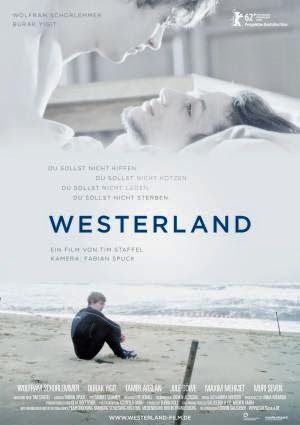 The setting for Tim Staffel’s adaption of his own novel is as bleak and desolate as the story itself. On the windswept icy mass of the island of Sylt off Germany’s most northernmost region, young Jesus is sitting alone on a bench in the middle on nowhere, with a plastic bag over his head. The troubled youth is trying to take his own life when Cem passes by and stops him. The young German Turk has a part time job and is studying landscape architecture and is more grounded than Jesus who has a problematic existence to say the least.
The setting for Tim Staffel’s adaption of his own novel is as bleak and desolate as the story itself. On the windswept icy mass of the island of Sylt off Germany’s most northernmost region, young Jesus is sitting alone on a bench in the middle on nowhere, with a plastic bag over his head. The troubled youth is trying to take his own life when Cem passes by and stops him. The young German Turk has a part time job and is studying landscape architecture and is more grounded than Jesus who has a problematic existence to say the least.Despite their differences they strike up an immediate friendship and establish a deep bond between them quite quickly. It’s a somewhat surprising relationship as Cem has an established life with family and friends and has ambitions, whereas Jesus seems to have little beyond his dependency on smoking pot and his bulimia. But as the two men start to hang out with each other as much as they can, they also become very dependent on each other.
Billed as a ‘gay love affair’ there are none of the traditional scenes of intimacy or affection: they shower together and wrestle, but in a very non-sexual manner. Yet somehow is it is very obvious that these boys have developed extremely deep feelings for each.
Cem really wants to save Jesus from what he sees as his self-destruction, but when the fun they have been having stops, it turns to fear. There is a very key scene towards the tail end of the movie when Jesus daubs the bathroom walls with Cem’s rules ‘Thou shall not smoke pot. Thou shall not throw up. Thou shall not lie. Thou shall not die’. It’s obvious that he is not going to be obey all four..
The whole thing is rather grim and depressing and as it is apparent from the offset that no-good can come from a relationship when one of the party has no faith in himself, then the other is either a Saint or a fool. The jury is still out on this one.


